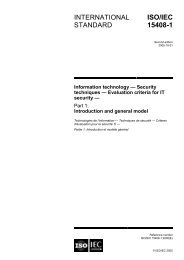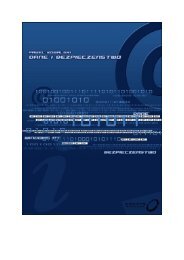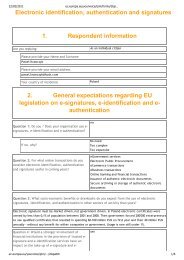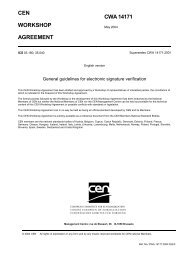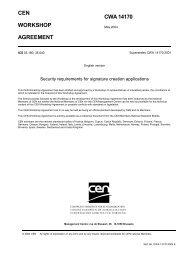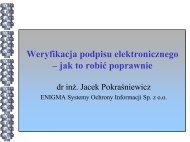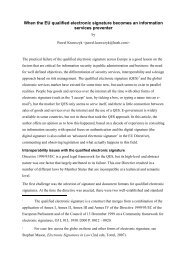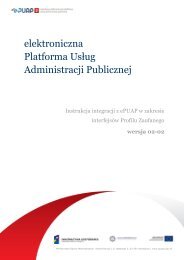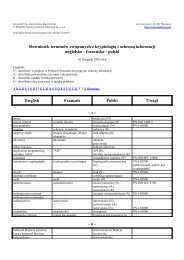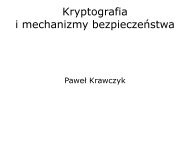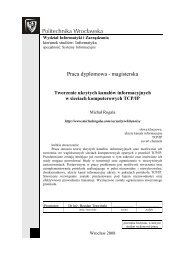FEEDBACK REPORT - IPSec
FEEDBACK REPORT - IPSec
FEEDBACK REPORT - IPSec
Create successful ePaper yourself
Turn your PDF publications into a flip-book with our unique Google optimized e-Paper software.
Security Plugtests® Event – PKI/XADES<br />
<strong>FEEDBACK</strong> <strong>REPORT</strong><br />
Version 1.0<br />
Date: 29 th June 2004
Technical Report<br />
Reference<br />
<br />
Keywords<br />
<br />
ETSI<br />
650 Route des Lucioles<br />
F-06921 Sophia Antipolis Cedex - FRANCE<br />
Tel.: +33 4 92 94 42 00 Fax: +33 4 93 65 47 16<br />
Siret N° 348 623 562 00017 - NAF 742 C<br />
Association à but non lucratif enregistrée à la<br />
Sous-Préfecture de Grasse (06) N° 7803/88<br />
Important notice<br />
Individual copies of the present document can be downloaded from:<br />
http://www.etsi.org<br />
The present document may be made available in more than one electronic version or in print. In any case of existing or<br />
perceived difference in contents between such versions, the reference version is the Portable Document Format (PDF).<br />
In case of dispute, the reference shall be the printing on ETSI printers of the PDF version kept on a specific network drive<br />
within ETSI Secretariat.<br />
Users of the present document should be aware that the document may be subject to revision or change of status.<br />
Information on the current status of this and other ETSI documents is available at<br />
http://portal.etsi.org/tb/status/status.asp<br />
If you find errors in the present document, send your comment to:<br />
editor@etsi.org<br />
Copyright Notification<br />
No part may be reproduced except as authorized by written permission.<br />
The copyright and the foregoing restriction extend to reproduction in all media.<br />
© European Telecommunications Standards Institute 2003.<br />
All rights reserved.<br />
ETSI
Technical Report<br />
Contents<br />
1 INTRODUCTION .................................................................................................................................................... 4<br />
2 DEFINITIONS AND ABBREVIATIONS.............................................................................................................. 4<br />
2.1 DEFINITIONS........................................................................................................................................................ 4<br />
2.2 ABBREVIATIONS .................................................................................................................................................. 4<br />
3. GOALS OF THE EVENT........................................................................................................................................ 5<br />
4 LIST OF PARTICIPATING COMPANY.............................................................................................................. 6<br />
EVENT’S PLANNING..................................................................................................................................................... 7<br />
TEST S BEDS ................................................................................................................................................................... 8<br />
XADES TEAM ................................................................................................................................................................. 8<br />
PKI TEAM ....................................................................................................................................................................... 8<br />
TESTS RESULTS FOR XADES..................................................................................................................................... 9<br />
XADES PARTICIPATING IMPLEMENTATIONS ................................................................................................................... 9<br />
UPC:........................................................................................................................................................................... 9<br />
Microsoft : ................................................................................................................................................................ 10<br />
CDC Mercure :......................................................................................................................................................... 11<br />
SEB IT : .................................................................................................................................................................... 12<br />
TESTS RESULTS BY PARTICIPANTS ................................................................................................................................. 13<br />
UPC .......................................................................................................................................................................... 13<br />
Microsoft................................................................................................................................................................... 13<br />
SEB IT....................................................................................................................................................................... 14<br />
CDC Mercure ........................................................................................................................................................... 14<br />
INTEROPERABILITY RESULTS FOR XADES TESTS........................................................................................................... 15<br />
TESTS RESULTS FOR PKI ......................................................................................................................................... 16<br />
PARTICIPATING IMPLEMENTATIONS .............................................................................................................................. 16<br />
SSH ........................................................................................................................................................................... 16<br />
IDEALX .................................................................................................................................................................... 16<br />
INTEROPERABILITY RESULTS ......................................................................................................................................... 16<br />
EE certification enrolment: ...................................................................................................................................... 16<br />
Cross Certification Enrolment.................................................................................................................................. 16<br />
Validation tests ......................................................................................................................................................... 17<br />
TECHNICAL <strong>FEEDBACK</strong>S ON XADES SPECIFICATIONS................................................................................. 18<br />
GENERAL COMMENTS ON XADES ........................................................................................................................ 19<br />
ETSI
Technical Report<br />
1 Introduction<br />
The event was held from 24-28 May 2004 at ETSI headquarters in Sophia Antipolis in the South of France. The main<br />
field of this event was the security, including PKIs systems and XAdES standards.<br />
It was organized in co-operation with ETSI’s Services and Actimage.<br />
For the first time, PKIs solutions are able to test their capacity of interoperability with others systems.<br />
The testing event focused on interoperability between different PKI systems, in particular about the validator system of<br />
each solution, and tested the compatibility of the XAdES messages generated by different providers.<br />
2 Definitions and abbreviations<br />
2.1 Definitions<br />
End Entity: This entity is optional and has the responsibility to register the new end-users.<br />
Validator: It‘s a system which is able to validate a certificate issued by a CA.<br />
Enveloped signature: The signature is over the XML content that contains the signature as an element. The content<br />
provides the XML root document element. Obviously, enveloped signatures must take care to not include their own<br />
value in the calculation of the .<br />
Enveloping signature: The signature is over the content found within an element of the signature itself. The<br />
(or its content) is identified via a (via a fragment identifier or transform).<br />
Canonicalization algorithm: This algorithm is simply a process that reads XML and converts it to a consistent form.<br />
The Canonicalization ensures that XML documents containing same intrinsic representation have the same binary<br />
representation, and therefore the same signature.<br />
2.2 Abbreviations<br />
XADES: XML Advanced Electronic Signatures<br />
PKI: Public Key Infrastructure<br />
SCEP: Simple Certificate Enrollment protocol<br />
PKCS#10: Public Key Cryptography standard 10 see RFC 2314<br />
CRL: Certification Revocation list<br />
CRLDP: CRL Distribution Point<br />
LDAP: Lightweight Directory Access Protocol<br />
CA: Certification Authority<br />
OCSP: Online Certificate Status Protocol<br />
EE: End Entity<br />
ETSI
Technical Report<br />
3. Goals of the Event<br />
The interoperability event was organized around two technologies: XAdES and PKI.<br />
Followings goals and advantages have been identified for this interoperability event:<br />
• · Check the interoperability between PKI solutions.<br />
• · Improve and validate the XAdES standardization (ETSI TS 101903 v1.2.2 published in April 2004). For sure<br />
the results of this event may have an impact in the next version.<br />
• · Opportunity to quickly discover errors in implementations with fast turn-around testings<br />
• · Bring Competitors together to progress on specification development and implementation<br />
ETSI
Technical Report<br />
4 List of Participating Company<br />
• Actimage<br />
• CDC-Mercure<br />
• GIP-MDS<br />
• Idealx<br />
• Macao Post eSignTrust Certification Authority<br />
• Microsoft EMEA<br />
• Panasonic Communication Co<br />
• S|E|B IT Partner<br />
• SETCCE<br />
• SSH Communications Security Corp.<br />
• University of Catalunya<br />
ETSI
Technical Report<br />
Event’s Planning<br />
<br />
<br />
<br />
<br />
<br />
!"#$<br />
%&<br />
%%<br />
%4<br />
%5<br />
"<br />
'<br />
$<br />
' 1")<br />
" <br />
"<br />
- 2<br />
# ,<br />
+3<br />
.!$<br />
"<br />
""("<br />
)<br />
<br />
*'<br />
' +'$<br />
<br />
!"#$<br />
!<br />
"#$<br />
<br />
, , <br />
"""<br />
- +<br />
-<br />
./0(+<br />
''$<br />
<br />
)<br />
' 1<br />
3 +<br />
'$<br />
<br />
!"#$<br />
%6 #<br />
)<br />
3" <br />
<br />
3 )+<br />
$<br />
<br />
%7<br />
!"#$<br />
%8<br />
8', <br />
<br />
$<br />
<br />
!"#$<br />
<br />
!"#$<br />
<br />
%9<br />
<br />
%: ! ! ! <br />
ETSI
Technical Report<br />
Test s beds<br />
XAdES Team<br />
The following tables show the different types of XAdES signature tested and the different interoperability tests built<br />
between each participants.<br />
Type of XAdES<br />
Language<br />
Company<br />
XADE<br />
S<br />
XADES-T<br />
XADES-<br />
C/X<br />
XADES-X-<br />
L<br />
XADES-<br />
A C Java C++ C#<br />
UPC X X X X X X<br />
CDC X X X X<br />
SEB-IT X X X X X X<br />
MICROSOFT X X X X X<br />
Generator\Validator UPC SEB-IT MICROSOFT<br />
UPC X X<br />
SEB-IT X X<br />
MICROSOFT X X<br />
CDC X X<br />
IAIK(1) X X X<br />
Baltimore(1)<br />
X<br />
BeTrusted(1)<br />
X<br />
(1)Not Present in this event but his XAdES implementation has been tested.<br />
PKI Team<br />
Only two companies participated to the PKI solutions interoperability testing: IdealX and SSH Communications<br />
Security Corp.<br />
ETSI
Technical Report<br />
Tests Results for XAdES<br />
XAdES Participating Implementations<br />
UPC:<br />
Implementation by<br />
UPC<br />
Implementation language<br />
Base cryptographic toolkit<br />
Base xml-signature toolkit<br />
Base xml toolkit<br />
Will be available in the<br />
following form<br />
Source code availability<br />
Person to contact<br />
Java<br />
Java SDK, SUN cryptographic provider<br />
UPC-xslib (a XMLDSIG tool implemented by UPC)<br />
JDOM using xerces parser<br />
Probably commercial licence<br />
No<br />
Juan Carlos Cruellas, cruella@ac.upc.es<br />
Other information of interest<br />
ETSI
Technical Report<br />
Microsoft :<br />
Implementation by<br />
Microsoft<br />
Implementation language C#<br />
Base cryptographic toolkit Microsoft .NET runtime 1.1<br />
Base xml-signature toolkit<br />
XMLDSIG standard implementation in .NET runtime<br />
Base xml toolkit<br />
Will be available in the following form<br />
Source code availability<br />
Person to contact<br />
Toolkit<br />
Free<br />
Eddy Rubens, eddyrube@microsoft.com<br />
Other information of interest<br />
ETSI
Technical Report<br />
CDC Mercure :<br />
Implementation by<br />
Implementation language<br />
CDC-Mercure – FAST Project<br />
C<br />
Java<br />
Base cryptographic toolkit<br />
Base xml-signature toolkit<br />
Microsoft Crypto API<br />
OpenSSL<br />
Aleksey Security Library<br />
(www.aleksey.com/xmlsec)<br />
JCE SUN<br />
Apache XML Security Library<br />
(http://xml.apache.org/security)<br />
Base xml toolkit LibXML2 (www.xmlsoft.org) Xerces / Xalan<br />
Will be available in the<br />
following form<br />
Source code availability<br />
CFAST Toolkit (Win32 / *nix)<br />
FAST ActiveX (Win32)<br />
no<br />
JFAST Toolkit (Win32 / *nix)<br />
FAST Applet (Win32)<br />
Person to contact<br />
Other information of interest<br />
Julien Montagne, julien.montagne@caissedesdepots.fr<br />
The CFAST Toolkit is currently undergoing evaluation within the French<br />
Common Criteria Evaluation and Certification Scheme (DCSSI)<br />
ETSI
Technical Report<br />
SEB IT :<br />
Implementation by<br />
SEB-IT<br />
Implementation language C Java<br />
Base cryptographic toolkit OpenSSL Bouncy-Castle<br />
Base xml-signature toolkit CDigiDoc JDigiDoc<br />
Base xml toolkit Libxml2 Xerces-J<br />
Will be available in the<br />
following form<br />
C library toolkit for Win32,Linux,<br />
FreeBSD<br />
COM component for Win32<br />
Java library toolkit<br />
Source code availability<br />
Person to contact<br />
Libraries are available today www.openxades.org<br />
Sinivee Veiko, veiko.sinivee@seb.se<br />
GUI application for Win32 available at www.id.ee<br />
Other information of interest<br />
GUI application for Linux available at<br />
http://www.sourceforge.net/projects/gdigidoc<br />
WebService based on SOAP and offering simpler XML signature service<br />
for web applications in test. Will be soon available at www.sk.ee<br />
ETSI
Technical Report<br />
Tests results by participants<br />
In this event, the priority of this test were twofold:<br />
Tests leading to validation failure:<br />
UPC<br />
• To go on with tests already defined in the first interoperability event. This was justified for both,<br />
implementations present in the first event and for those already present in the first event, as these<br />
new interoperability tests could raise new issues not raised in the first event.<br />
• To validate test failures cases where the tools should notify a failure in the verification of XAdES<br />
signatures.<br />
• Tests with failures related with SigningCertificate<br />
• Tests with failures related to SignaturePolicyIdentifier<br />
• Tests with failures related to CompleteCertificateRefs<br />
• Test with failures related to CompleteRevocationRefs<br />
• Test failures related with CertificateValues property<br />
• Test failures related with RevocationValues property<br />
• Test failures related with AllDataObjectsTimeStamp property<br />
• Test failures related with IndividualDataObjectsTimeStamp property<br />
• Test failures related with SignatureTimeStamp property<br />
• Test failures related with SigAndRefsTimeStamp property<br />
• Test failures related with RefsOnlyTimeStamp property<br />
• Test failures related with ArchiveTimeStamp property<br />
1. Verifying signatures<br />
• SEB-IT: all XAdES signature tests passed<br />
• Microsoft: all XAdES signature tests passed<br />
• CDC: all XAdES signature passed<br />
• IAIK: all XAdES signature tests passed<br />
• Betrusted: all XAdES signature tests passed<br />
2. Producing signatures<br />
Microsoft<br />
• All XAdES forms have been produced<br />
1. Verifying signatures<br />
• UPC: all XAdES signature tests passed<br />
• SEB-IT: all XAdES signature tests passed<br />
ETSI
Technical Report<br />
• CDC: all XAdES signature tests passed<br />
• Baltimore: all XAdES signature tests passed<br />
• IAIK: all XAdES signature tests passed<br />
2. Producing signature<br />
• All XAdES forms have been produced (except XAdES-A)<br />
SEB IT<br />
1. Verifying signatures<br />
• UPC: The verification failed because the certificate was expired. SEB IT<br />
recommends to use timezone info either in form CCYY-MM-DDTDD:HHZ or<br />
CCYY-MM-DDTTDD:HH-xx:yy for the SigningTime Element. Finally, he can<br />
read UPC Signature and validate then except the certificate problem.<br />
• Microsoft: Validate Microsoft’s XAdES#1 form but recommends to use timezone<br />
info either in form CCYY-MM-DDTDD:HHZ or CCYY-MM-DDTTDD:HH-xx:yy<br />
for the SigningTime Element.<br />
• IAIK: The verification failed because the KeyInfo element was missed. SEB IT said<br />
probably he was able to validate IAIK’s signature soon by reading signers certificate<br />
from file.<br />
2. Producing signature<br />
CDC Mercure<br />
• XAdES form has been produced<br />
1. Verifying signatures<br />
• No signature of the other participants validated.<br />
2. Producing signature<br />
• XAdES form (enveloped signature and enveloping signature)<br />
« This first participation to an ETSI PlugTest has proven to be a really useful experience for CDC-Mercure and the<br />
FAST project.<br />
Before coming to Sophia we didn’t know exactly what to expect because we were only able to create enveloped<br />
signature and the tests specifications were exclusively dedicated to enveloping signature. But we were reassured as<br />
soon as we arrived.<br />
Achieving the validation test cases on our XAdES impletementation was a combined effort of all participants. We had<br />
to modify our API to change the canonicalization algorithm from its exclusive to its inclusive form while other<br />
implementers were adding enveloped signature support in their validation tools. Finally we were able to verify that the<br />
FAST signature format met XAdES requirements and we would like to warmly thank all the participants for this result.<br />
This event gave use the opportunity to gain a better knowledge of the latest XAdES evolutions and of their potential<br />
impact on our work. It gave us excellent inputs for our future developments, both on the signature creation and<br />
signature validation sides. » (Jérôme Bordier, CDC-Mercure).<br />
ETSI
Technical Report<br />
Interoperability results for XAdES tests<br />
The interoperability tests uncovered the following issues:<br />
1. Problem about the certificate serial number length, present in the <br />
element defined in XMLSig. In fact, the content of this element, which contains the serial<br />
number, is declared as W3C XML Schema integer. This is a 64 bits type and long certificate<br />
serial number cannot be contained in this element. Certificates with serial number greater<br />
than the upper boundary can not be dealt with. This problem should be fixed in the next<br />
version.<br />
2. Problem with contents of element . XAdES uses this element when<br />
making references to certificates. XMLSig clearly references RFC 2253 for specifying the<br />
encoding of a Distinguished Name as a String. Nevertheless, some implementations did show<br />
interoperability problems when comparing contents of such strings. This is not a problem of<br />
XAdES or XMLSig but of the implementations themselves.<br />
Those implementations that had not participated in the first interoperability event had the chance of offering their<br />
signatures to other participants so that tests could be made, and vice-versa, they had the opportunity of, after doing<br />
some re-factoring (as SEB-IT did), verify the signatures of other participants.<br />
Those implementations that had participated in the first event, could go on with tests that had not been done there.<br />
These tests sometimes uncovered problems within the tools themselves and in general made them to go further in the<br />
path of achieving interoperable implementations.<br />
ETSI
Technical Report<br />
Tests Results for PKI<br />
Participating Implementations<br />
SSH<br />
Company<br />
Product Name<br />
Person to contact<br />
SSH Communication Security Corp.<br />
SSH Tectia Certifier v3.0.0beta/v2.1.3<br />
(+ some tools from other SSH Tectia products)<br />
Tomi Kause toka@ssh.com<br />
IDEALX<br />
Company<br />
Product Name<br />
Person to contact<br />
Idealx<br />
IDXPKI<br />
Cyril Lavoisy : clavoisy@idealx.com<br />
Julien Gilli : jgilli@idealx.com<br />
Benoit Caccinolo : bcaccinolo@idealx.com<br />
Interoperability results<br />
During this event, the two actors of PKI domain (SSH and Idealx) tested some interoperability problems specific to<br />
architecture:<br />
EE certification enrolment:<br />
This test is a very basic mutual end-entity certificate enrolment test.<br />
SSHIdealx<br />
IdealxSSH<br />
PKCS#10 OK Not tested (1)<br />
SCEP OK OK<br />
(1) We can notice this test was skipped because the cross certification test the same functionality and more.<br />
Cross Certification Enrolment<br />
Both ends created and submitted (via a web form) a PKCS#10 request for their self-signed root CA. Both CAs mutually<br />
accepted each others requests successfully, and the SSH CA successfully published a cross-Certificate Pair to the LDAP<br />
directory.<br />
This test required some manual steps from both participants:<br />
• The Idealx CA didn’t even claim to support cross-certification, so some manual tweaking was<br />
required to preserve the basic Constraints in the request.<br />
• An external script was created for the SSH CA to create and publish the Cross-Certificate Pair<br />
object to LDAP.<br />
ETSI
Technical Report<br />
<br />
SSHIdealx<br />
IdealxSSH<br />
#';%& OK OK<br />
Validation tests<br />
Idealx couldn’t do this test because the Idealx System has not a stand-alone validator. That’s why the N/A for all the<br />
validation tests is written.<br />
• Validation/Simple end-entity validation<br />
SSH->Idealx<br />
"1<<br />
CRL/HTTP CRLDP # N/A<br />
OCSP Fail OK<br />
(with the regular<br />
OpenSSL OCSP client)<br />
The OCSP validation against the Idealx system failed because the SSH validator rejected the self-signed OCSP<br />
responder certification of the Idealx responder.<br />
• Validation/Cross recognition<br />
The SSH validator was initialised with multiple trust anchors (self-signed root certifications). With this setup the<br />
validator was able to validate EE certifications issued by any of the CAs/SubCAs under those roots.<br />
SSHIdealx<br />
IdealxSSH<br />
CRL/HTTP CRLDP # =<br />
• Validation/Cross certification<br />
The SSH validator was initialised with one SSH self-signed root as the trust anchor. The validator successfully<br />
validated a certificate issued by the Idealx CA, i.e. trust was propagated thru the cross certificate.<br />
SSHIdealx<br />
IdealxSSH<br />
with CRLs OK N/A<br />
ETSI
Technical Report<br />
Technical feedbacks on xades specifications<br />
This event was scheduled shortly after XAdES version 1.2.2 publication. This version incorporated most of the<br />
suggestions raised in the first interoperability event. The scheduling of the event made unfeasible to orient it towards<br />
XAdES v 1.2.2, as not many implementations would exist at that time. In consequence, the event addressed tests on<br />
XAdES v1.1.1. The tests specified for the first event were enlarged for covering a number of situations where XAdES<br />
signatures validation should fail for specific reasons.<br />
<br />
The first event uncovered a significant number of issues and served for proposing changes to the specification. XAdES<br />
v1.2.2 incorporated most of them. As a consequence, not so many issues have been raised in the second one. All of<br />
them have already been mentioned before. Below follows a short summary:<br />
• Issue-E2#1. Interoperability tests failed with references to certificates whose serial number is<br />
greater than the boundary fixed by the integer type defined in XML Schema. XAdES relies on the<br />
definition of element present in XMLSig. Perhaps a note to XMLSig<br />
email list could raise the issue and make the team in charge of its maintenance to deal with it. A<br />
different approach could be to define within XAdES a new type that would overcome this<br />
restriction.<br />
• Issue-E2#2. Interoperability tests proved that some problems appeared when dealing with the<br />
contents of i.e., Distinguished Names encoded as strings. XMLSig clearly<br />
establishes that this encoding must be as specified in RFC 2253. Nevertheless some<br />
interoperability problems seem to prove that perhaps a remainder of this reference could be<br />
incorporated in XAdES, as a way of facilitating developments.<br />
In addition to that, presentations in the event were certainly interesting. Specially, the one by Mr. Blazic showed the<br />
usage of certain XAdES forms in real environments and pointed out a number of issues that could enlarge it scope and<br />
increase its usefulness. The proposal of defining archiving properties is one of the most interesting ones, and it may<br />
impact future standardization work.<br />
The effort made in the definition of new tests cases, will likely be useful in the definition of tests cases for XAdES<br />
v1.2.2<br />
ETSI
Technical Report<br />
General comments on xades<br />
Comments by Juan Carlos Cruellas:<br />
Below follow comments some comments in the view of the achievements of the event:<br />
• On the scheduling.<br />
o<br />
o<br />
o<br />
o<br />
The fact that the event took place shortly after the publication of XAdES v1.2.2 avoided<br />
the possibility of incorporating tests of this version, which would have allowed to asses<br />
the goodness of the suggestions med in the first event.<br />
On the other hand new tools were present in the event that could be tested with others<br />
also present in the first one, so that the range of tools that have been involved in these<br />
interoperability event has been enlarged.<br />
The event was overlapped with an ESI meeting. As I personally had to attend both<br />
events, the result was that I had to split my time between them.<br />
In consequence, I would humbly suggest that scheduling of future events would take into<br />
account the aforementioned comments. Specifically, I would suggest not to overlap any<br />
event with ESI meetings or other meetings directly related with XAdES. I would also<br />
suggest for the future, not to celebrate events shortly after the publication of new<br />
versions of XAdES.<br />
• On the benefits:<br />
o<br />
o<br />
o<br />
UPC was able to go further in tests with Microsoft and with SEB-IT, which in fact<br />
made progress the tool itself.<br />
At the general level, a number of tests cases for unsuccessful verification of signatures<br />
has been added to the initial set of the first event. As XAdES v1.2.2 has a great amount<br />
of commonality with XAdES v.1.1.1, this means that a large amount of them will also<br />
serve for events organized around XAdES v1.2.2.<br />
Few issues not raised in the first event were uncovered in the second one. The lecture of<br />
this fact is twofold:<br />
<br />
<br />
First, these issues will feed the standardization process that is not stopped.<br />
Second, somehow, this low number is telling us that comments raised during the first event<br />
uncovered almost all the relevant issues with respect to the standards.<br />
• On the future:<br />
o<br />
New events must be much more focussed on XAdES v1.2.2, the latest version of the standard. This means<br />
that a work has to be done for:<br />
<br />
<br />
Using those tests cases applicable to both versions.<br />
Defining new tests cases applicable only to XAdES v1.2.2.<br />
Before the celebration of the next event, ETSI should be more active in supporting the XAdES tools being<br />
developed. Somehow it should promote the usage of the email list so that the different entities that participated in<br />
both events regularly exchange information on their developments, just as it was done before the first event.<br />
Besides, ETSI and W3C are currently working in setting up a Joint Working Group for dealing with XAdES. This<br />
will likely imply that XAdES will eventually reach the W3C Recommendation status. This also imply that anyone<br />
interested in XAdES should be aware that there will be an opportunity to become member of this new group once<br />
created, and bring her expertise to it and help to improve XAdES.<br />
ETSI and W3C are now dealing with the policitical, administrative and management stuff.<br />
ETSI



